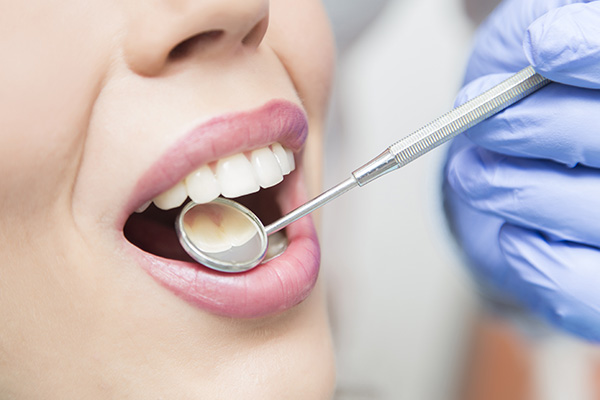 General dentistry screens patients for oral cancer regularly. Your dentist performs this screening to look for any signs of cancer or precancer in your mouth. By detecting cancer early, there is a better chance of successful treatment. For many, an oral cancer screening is a routine part of the dental exam. General dentistry is more likely to perform the oral cancer screening if you have any of the risk factors associated with oral cancer. Here is a little more about what to expect.
General dentistry screens patients for oral cancer regularly. Your dentist performs this screening to look for any signs of cancer or precancer in your mouth. By detecting cancer early, there is a better chance of successful treatment. For many, an oral cancer screening is a routine part of the dental exam. General dentistry is more likely to perform the oral cancer screening if you have any of the risk factors associated with oral cancer. Here is a little more about what to expect.
What is oral cancer?
Abnormal cell growth in the mouth or throat can become oral cancer. Cancerous growths can happen on the lining of the lips, the inside of the mouth along the gums, the cheeks, and the tongue. Oropharyngeal cancer is when the growths develop at the base of the tongue, on the tonsils, on the soft palate, or along the walls of the throat. Not all growths that the dentist finds in the mouth are cancerous. The dentist can take a biopsy to determine if the growth is concerning.
The oral cancer screening
The dentist will use gloved hands to examine the patient’s mouth. During this general dentistry exam, the dentist is looking for any discolored patches or sores, as well as any unusual lumps in the mouth or throat. Some dentists also use a special light that can highlight any unhealthy tissue. There is also a special dye the patient can swish in their mouths that will cause abnormal cells to show up as blue. Patients should also talk to the dentist about any risk factors that would make the patient more likely to develop oral cancer.
Touch is important
An oral exam is not only a visual exam of the mouth. The dentist will feel the patient’s throat and face on the outside. However, it is also important for the dentist to feel the inside of the mouth. This is to detect any hard lumps of tissue. For many people, oral cancer is painless in the early stages, but a dentist can detect many cases. Not every abnormal growth turns out to be cancer. But early detection is valuable because catching oral cancer early gives the patient a much better prognosis.
Risk factors for oral cancer
Although many dentists will perform a screening on every patient, some risk factors can increase the chances of oral cancer developing. Men are twice as likely as women to develop oral cancer. Those over the age of 55 and those exposed to human papillomavirus (HPV) are also more at risk. Smokers and people who consume alcohol regularly are also at a greater risk independent of their age.
Oral cancer screening in general dentistry
If your dentist finds anything of concern, you will go back for a follow-up visit. You should make a list of questions you want to ask the dentist before going for your visit. Your dentist will walk you through the procedure and what the screening looks for. Getting an oral cancer screening is a good way to stay on top of your oral health.
Request an appointment or call Bagnall Family Dentistry at 978-655-2005 for an appointment in our Andover office.
Related Posts
When you choose general dentistry services for your oral health needs, you get a wide range of care. This includes not only routine checkups but diagnoses of various conditions and treatment of these issues. One of the most common ailments that you might encounter is tooth pain. These feelings can indicate different problems, but your…
Seeking general dentistry help is vital for good oral health. You should visit the dentist at least every six months for checkups. These trips to the dentist’s office allow for diagnoses, treatments, and preventive measures. But you also need to commit to good oral hygiene at home every day. Brushing and flossing are the most…
Your general dentist knows how important it is to keep teeth healthy and intact. Any impact on the facial area, especially near the mouth, can injure a tooth. Pain is a common indication of a dental injury. Coming in for a dental treatment is crucial to saving your tooth. If you want to know how…
